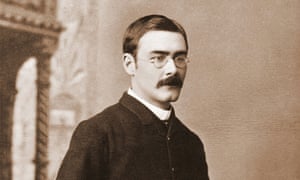by Rudyard Kipling
England, 1901
With fear and horror everywhere these days, I hope you'll forgive me this exercise in escapism. Anyway, I read Kim recently and thoroughly enjoyed it. The tale of Kimball "Kim" O'Hara, the son of an Irish soldier who's grown up native as an orphaned street urchin in Lahore, the novel follows our crafty young hero as he travels across creation with an elderly Tibetan lama, receives a British education at an elite boarding school described as a place where "precocious youths" would be sent for "generation [after] sallow-hued generation" (123), and is eventually lured into a prospective career with the Secret Service as a would be participant in the Great Game all while struggling to come to grips with his own identity. Part bildungsroman, part travelogue, part adventure yarn, with just a hint of spy novel thrown into the mix, Kim moves at a brisk (if episodic) pace and manages to capture its title character's wide-eyed appreciation of and zest for the human pageantry on display in every nook and cranny of his journey. In addition to touching on the appeal of both the active and the meditative life in highlighting the bond between the young Kim and the elderly lama--seekers both--Kipling connected with me emotionally by evoking some of the affection of a Don Quixote and Sancho Panza among other famous odd couples of fiction. As far as the novelist's well-known "problematic" side, I didn't feel that was really in evidence here. Instead, we're presented with the lesson that the "Sahib" Colonel Creighton imparts to Kim, warning him to eschew race and class prejudice and not to "at any time be led to contemn the black man... There is no sin so great as ignorance. Remember this" and the evidence that Kim himself buys into this open-minded worldview. "And who are thy people, Friend of all the World?" the Afghan horse trader Mahbub Ali asks. To which Kim replies, joking about a "little clay-walled room" but symbolizing the vast expanse of India before them, "This great and beautiful land" (119 & 136). A sparkling story and just the tonic I needed.
Rudyard Kipling (1865-1936)





